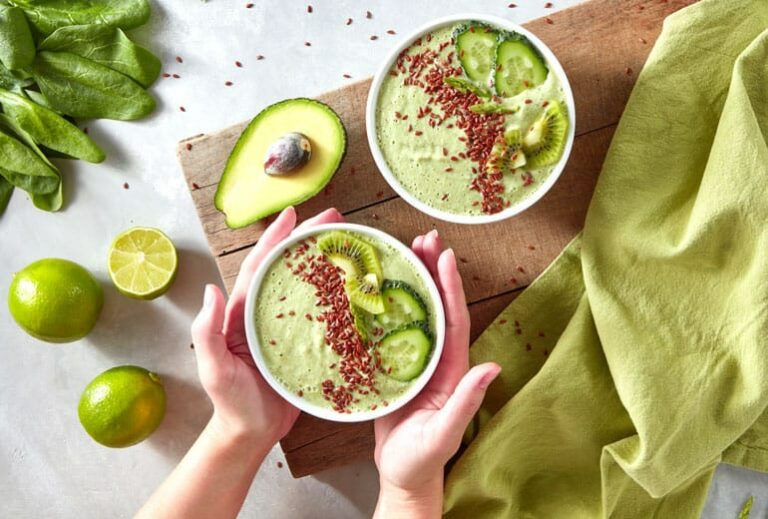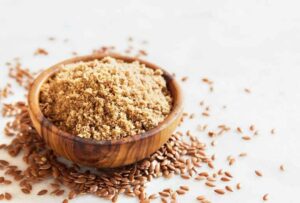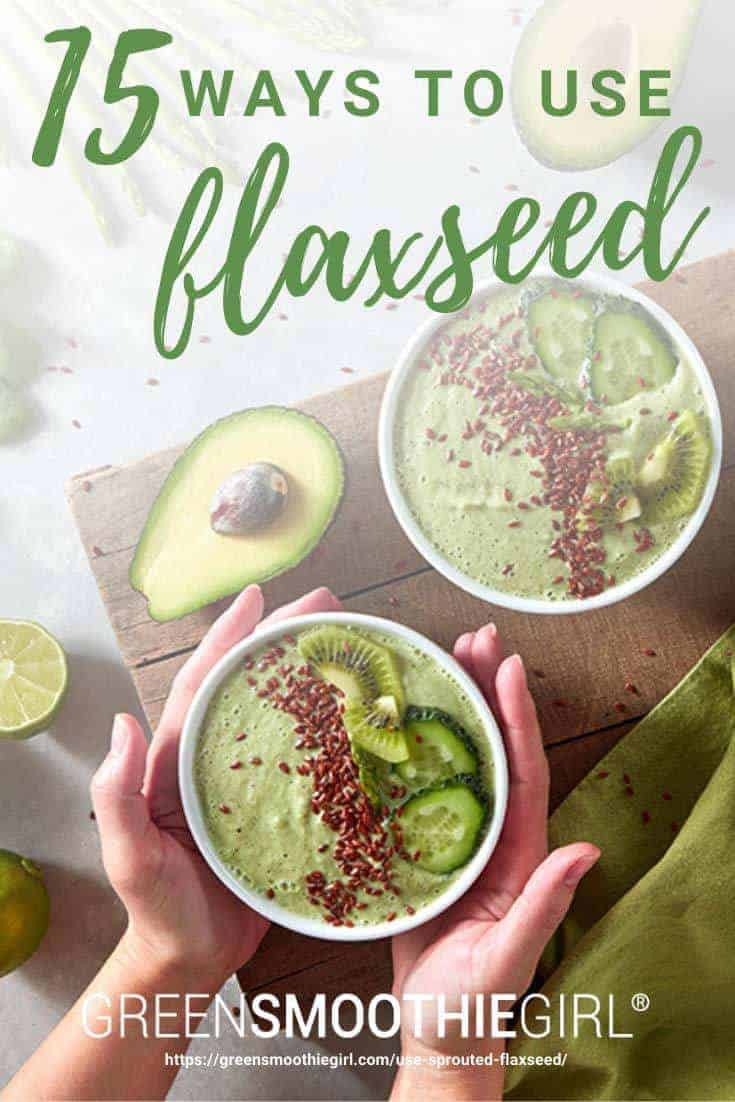15 Ways to Use Sprouted Flaxseed

Seeds, as small as they can be, are some of the most highly nutritious foods. All of that power in a tiny package provides the seed everything it needs to grow into a strong plant, and you can enjoy those same advantages by incorporating them into your diet.
The key is sprouting, which unlocks all of their valuable vitamins and minerals and makes them more easily absorbable by your body.
In this article:
- Sprouted Seeds15 Ways to Incorporate Sprouted Ground Flaxseed and Other Ground Seed Blends Into Your Daily Diet
Sprouted Seeds
Sprouted seeds are living superfoods, particularly sprouted flax. Flaxseed is already what I consider a "miracle superfood" for all of its amazing health benefits, and sprouting massively multiplies the best features, including its ability to balance cholesterol, strengthen skin and nails, stabilize mood, and protect your bones, heart, and brain! Sprouted broccoli, another great option, has been found to help protect against carcinogenic compounds that cause cancer.1
But because sprouting flax (and other superfood seeds like chia) tends to make them go gooey, they are notoriously difficult for the home sprouter.
So an easy way to get all the benefits of sprouted seeds like flax and chia is to purchase them already sprouted, gently dried (below 100 degrees, to preserve enzymes), and cold ground.

You can purchase ground sprouted seeds and make it easier for you to get those health benefits.
This ground meal is incredibly nutritious and versatile, making it much easier to get those essential fatty acids (EFAs) Omega-3, Omega-6, and Omega-9 in your diet every day. Remember, these Omega EFAs are called “essential” because your body can’t produce them on its own, meaning you must get them from your diet.
15 Ways You Can Incorporate Sprouted Ground Flaxseed and Other Ground Seed Blends Into Your Daily Diet
1. Add it to your smoothies
This is my favorite way to add some extra nutrition to your smoothies without altering the taste. Just two tablespoons of any quality sprouted seed powder will cover your EFA needs for the whole day. Scoop it into your blender with the rest of your smoothie ingredients, then blend away! Keep in mind that flax and chia both absorb some liquid, so you may have to adjust the amount of liquid in your recipe to maintain the consistency that you like.
2. Substitute a portion of flour in baked goods
Baking swaps can be tricky, so it’s best to start small to avoid risking it not turning out. Try swapping ¼ of the called-for amount of flour in cookies or quick breads. Because flax is a dense replacement for flour, it’s best used in goods that don’t need to rise, so avoid using it as a flour substitution in lighter, fluffier recipes, such as for cakes. While omega fatty acids are typically sensitive to high heat, you don’t have to worry about flax going rancid in the oven; sprouting stabilizes the fat so it can stand up to the higher temperature. Try my yummy Flaxseed Cookies recipe for a great introduction to baking with sprouted flaxseed!
3. Use as an egg replacer
Easily make a flax “egg” that can be used as a binder in baked goods by mixing one tablespoon of flax or tri-omega meal with three tablespoons of water. You can either place it in a small jar and shake vigorously for about 30 seconds, or whisk and let sit for about 10 minutes, until it gels and becomes gooey like an egg. This won’t work in an omelet, of course, but it substitutes wonderfully in things like cookies, muffins, brownies, and pancakes.

Flaxseed substitutes for eggs if you want vegan baked goods that taste just as yummy.
4. Thicken your morning oats
If you like your oatmeal nice and thick, stir in a tablespoon or two after you’ve finished cooking. If it ends up being a little firmer than you expected, simply add a little extra hot water to thin it out to your desired consistency. Hearty, filling, and delicious!
5. Sprinkle over yogurt
Another easy way to get the perks of flax is on top of your yogurt, in lieu of or in addition to crunchy granola. You can even make a fruit parfait, layering with yogurt, flax, and berries. This is great for meal prepping in big batches and makes an easy grab-and-go meal for busy families.
6. Make a seed porridge
An easy breakfast recipe that comes together quickly is 2 tbsp coconut flakes, 1 tbsp chopped nuts of your choice, and 2 tbsp of your sprouted seed meals. Mix this together and add about ¼ cup hot water and allow it to gel together a few minutes to become a porridge. Stir in a tablespoon or two of dairy-free milk to add some richness, then top with cinnamon and fresh fruit! Berries, peaches, and apples are some favorites, but this works with any fresh seasonal fruit.
7. Use a scoop in place of breadcrumbs
As I covered, sprouted ground flax and sprouted ground chia can be an excellent egg-like binder for baked goods, but the binding benefits don’t stop there. If you’re looking for gluten-free ways to enjoy comfort foods like regular or vegan meatballs and meatloaf, you can also use sprouted flax in those recipes as a substitute for breadcrumbs. It may take some experimenting with the exact swap to get the consistency you prefer, but start with an equal amount to keep the result from being too dense.
8. Make a fiber-filled batter
Try using sprouted ground flax as a batter for coating fish instead of using flour, or use it to coat veggies like zucchini slices or cauliflower before baking or frying. This is a gluten-free substitute that makes for a crispy bite with a nice and light toasted flavor.
9. Add to homemade granola bars.
Granola bars can be a great option to have on hand for on-the-go snacking. Adding a tablespoon or two to the mix increases the fiber content and, when mixed with a little bit of liquid, is a solid binder for the homemade bars.

Try out my Banana Oat Granola Bars with flaxseed for delicious health benefits on-the-go.
10. Blend into homemade hummus.
If you don’t mind the little flecks of nutritious goodness dotting your hummus, add a couple tablespoons to your food processor when making hummus. Because these ground sprouts have a fairly neutral flavor, they integrate well into dips like this, whether it’s a classic savory hummus or a delicious, chocolaty dessert hummus!
11. Sprinkle on a salad
To get the amount of fiber we need from a salad alone, you might as well be chewing all day long. While vegetables do contain good amounts of the fiber we need, most of us still aren’t getting enough, so adding a fiber-rich topping on a salad helps you reach your daily quota. Dress your salad well before sprinkling the powder over the leaves to make sure it sticks instead of getting stuck in the bottom of your bowl, soaking up all the vinaigrette. Try it out in these yummy complete-meal salads!
12. Stir into a soup
After you’ve finished cooking your soup and removed it from the heat, you can either sprinkle a teaspoon of sprouted seed powder on top as a garnish or stir it right in. If it’s a creamier soup, remember that flax will thicken it a bit, so adjust the broth accordingly.
13. Doctor up your toast
Whether you’re slathering your toast with nut butter or avocado, sprinkling flax on top gives you an extra fiber boost. Try it on sweet potato toast for even more nutrition; it contains Vitamin A, which is fat soluble, meaning it needs the fat in flax and other toppings to be absorbed.
Another way to fancify your breakfast? Roll your french toast in ground flax to coat before cooking it in the skillet.

Sprouted flaxseed is perfect for breakfast; start out every day with it and see how your health improves.
14. Add to sauces
Flax can be used to make a gluten-free roux for starting creamy soups and sauces, too! It doesn’t quite have the same thickening strength as flour, so you’ll have to use about twice the amount that the roux calls for. This works great in a mushroom-based gravy if you’re planning a plant-based holiday meal.
15. In protein balls or energy bites
Whatever you choose to call them, flax is an easy add-in when you're making the dough for these easy snacks. They are extremely customizable, and you don’t even really need a recipe to begin. Just mix some nut butter with flax and other ingredients you like (coconut flakes, cacao powder, chopped nuts, honey, oats—it’s up to you!) until you have a dough that's just wet enough to hold together when squeezed between your fingers. Roll into 1-tbsp sized balls and refrigerate!
These are just a few of the many ways you can use sprouted seed powders in your daily life. Give them a try and let us know your favorite one!
Read next: 23 Ways to Use Bone Broth Protein

Disclosure: This post may contain affiliate links that help support the GSG mission without costing you extra. I recommend only companies and products that I use myself.
Sources
- Johns Hopkins Medical Institutions (1997, September 19). Cancer Protection Compound Abundant in Broccoli Sprouts, Johns Hopkins.
Posted in: Preparedness, Recipes, Whole Food














